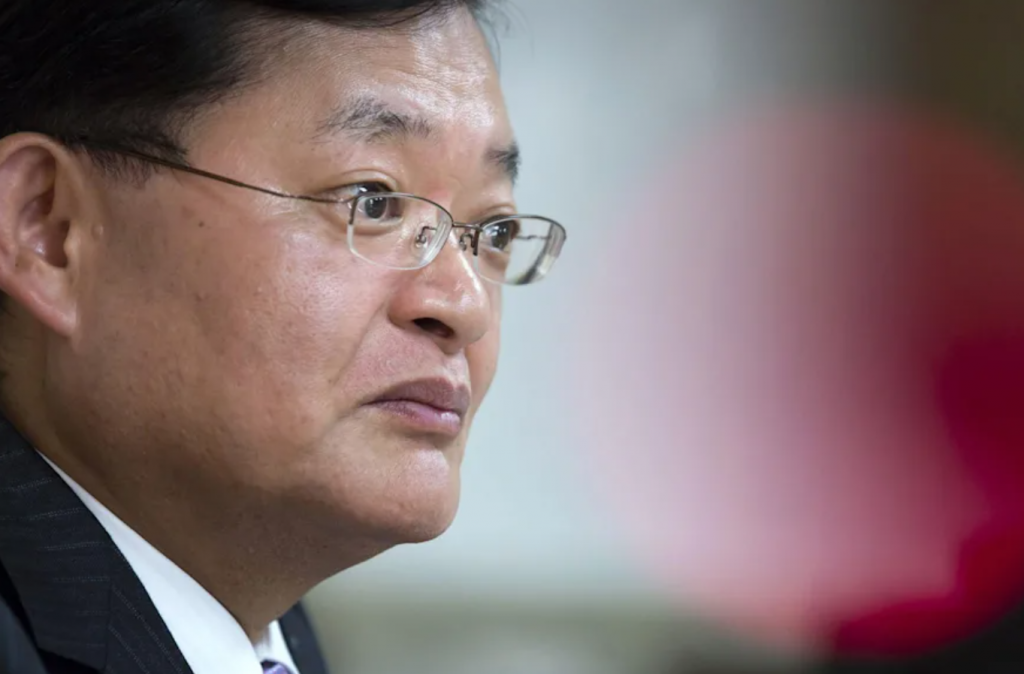
Toshiba Corp. said Chief Executive Officer Nobuaki Kurumatani will be replaced by Chairman Satoshi Tsunakawa, an abrupt leadership reshuffling that casts doubt on potential buyout offers for the $20 billion Japanese icon.
Toshiba said the changes are effective immediately in an announcement Wednesday. The company will soon begin considering successors for Tsunakawa, who returns to the CEO job he held previously, said Osamu Nagayama, chairperson of the board, during a press conference in Tokyo.
The decision came as factions within the conglomerate mounted resistance to a potential buyout offer from CVC Capital Partners — where Kurumatani previously worked. Some executives felt the offer undervalued a storied Japanese corporation that still holds valuable energy and semiconductor assets, according to people familiar with matter, who declined to be identified discussing internal issues. Separately, private equity firm KKR & Co. is exploring a rival offer for Toshiba, Bloomberg News reported.
“The optics, combined with the facts that CVC’s bid is now supposedly lower than KKR’s, and that CVC lacks experience with deals of such scale, probably mean it is out of the running,” said Mio Kato, an analyst with LightStream Research who publishes on Smartkarma.
Nagayama, the Toshiba board chairperson, said he isn’t sure whether Kurumatani’s resignation will affect talks with CVC because the offer is “very preliminary and not formal.” He noted CVC voiced support for current management while Kurumatani was in charge.
The company’s shares rallied after news of KKR’s possible bid, but then pared those gains to close 5.8% higher.
Kurumatani suffered a sharp drop in support among the company’s executives and other staff. Employees who have confidence in the CEO fell to less than 60% in an internal January poll, down from more than 90% last year, Bloomberg News reported this week. More than 20% expressed a lack of confidence in his leadership, up from less than 5% previously.
The survey results prompted Toshiba to conduct detailed interviews with a narrower group of about 30 top executives and more than half of them expressed a lack of confidence in Kurumatani.
“Kurumatani’s resignation settles some issues, gives the new CEO some breathing room and the benefit of the doubt as long as he makes the right noises,” said Travis Lundy, an independent analyst who publishes on Smartkarma. “It will improve morale slightly internally as well. But the issues that have caused problems with shareholders are also at the board level.”
The loss of confidence in Kurumatani was due in part to his decision to stick with three-year targets set in 2018, one of the people said. Many executives thought those goals were no longer realistic because of the Covid-19 pandemic and feared pressure to meet them resembled the rigid attitude of his predecessors, which led to an accounting scandal, the person said.
In the press conference Wednesday, Nagayama said the CEO was leaving because the company had made its return to the first section of the Tokyo Stock Exchange.
“Kurumatani offered his resignation as he feels his job to rehabilitate Toshiba is done with the return to the TSE’s first section,” Nagayama said. “We appreciate his efforts.”
He said Kurumatani chose not to attend the press conference. The departing CEO did leave a letter, which a Toshiba spokesman read aloud.
Kurumatani faced opposition outside the company too. He held on to his position by a slim margin last year, when only 57.2% of Toshiba shareholders approved of keeping him in the job. Questioning the transparency and process of that vote, Toshiba’s largest investor Effissimo Capital Management has requested an independent investigation, which was green-lit at an extraordinary shareholder meeting in March.
KKR is weighing a bid that would be likely to value Toshiba above the $21 billion buyout proposal that it’s already received from CVC, said one person familiar with the matter, who asked not to be identified as the details aren’t public. Canadian investment giant Brookfield Asset Management Inc. is also in the preliminary stages of exploring an offer for the company, including how such a bid might be structured, a separate person with knowledge of the matter said.
The deliberations are at an early stage, no final decisions have been made, and the discussions may not lead to firm offers, the people said.
Tsunakawa, the returning CEO, spent time during the press conference Wednesday offering reassurances that Toshiba would remain a strong Japanese company and invest in research and development. His comments appeared aimed at reassuring employees and business partners in the wake of the CVC offer.
He also discussed Toshiba’s stake in Kioxia Holdings Corp., the memory chip business in which Toshiba sold off a majority stake. Tsunakawa said Toshiba would not sell its remaining holdings to a foreign semiconductor firm and that he anticipates the company will go public. The Wall Street Journal reported that Micron Technology Inc. and Western Digital Corp. are each exploring a potential deal for Kioxia.
“We remain committed to provide our support to Kioxia’s IPO, and our stance on selling our holdings is unchanged,” he said.





























